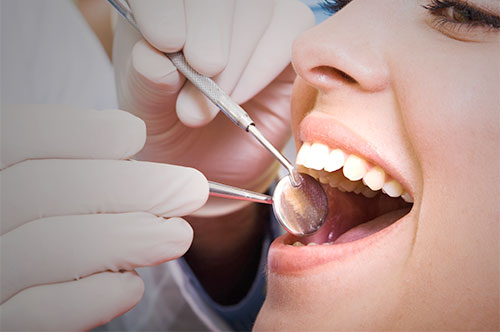Stress affects your thoughts and energy, and can also have a significant effect on your smile. While most people expect tension to show up as a headache or poor sleep, you may not realize that mental health impacts your oral health. If your daily routine feels off or your oral health hasn’t felt like a priority lately, you’re not alone. That’s why we wanted to share how stress may be affecting your smile and what you can do to manage it.
- Stress Can Disrupt Your Oral Care Routine
When life feels overwhelming, even the most basic routines can take a backseat. You might skip brushing before bed, forget to floss, or put off scheduling your regular dental cleaning. Over time, these small slips can add up and lead to plaque buildup, gum irritation, or more frequent cavities.
The good news is that small improvements make a big difference. Re-establishing a simple morning and evening routine, even if it starts with just brushing twice a day, helps restore that sense of control and protects your long-term oral health.
- Anxiety Often Leads to Clenching and Grinding
Emotional stress doesn’t always stay in the mind. Many people unconsciously clench their jaw or grind their teeth during the day or while they sleep. This habit, called bruxism, can wear down enamel, cause jaw soreness, and even lead to chipped or cracked teeth over time.
If you wake up with tension in your jaw or frequent headaches, it may be time to talk with your dentist. We can create a custom nightguard can protect your teeth while you sleep, and incorporating stress-relief practices like stretching or mindfulness may also help reduce the habit.
- Chronic Stress Can Worsen Gum Inflammation
Your immune system responds to stress with inflammation, and that can show up in your gums. Patients under chronic stress may experience increased bleeding, tenderness, or gum recession, even if they’re brushing regularly.
Staying on track with professional cleanings and daily flossing can help reduce inflammation and prevent gum disease from progressing. If your gums feel sensitive or swollen, don’t ignore it. Early attention leads to easier treatment.
- Dry Mouth Is a Common Side Effect
Stress itself can reduce saliva production, and many medications used to treat anxiety or depression can also cause dry mouth. Saliva plays a key role in protecting your teeth. It helps wash away bacteria, neutralize acid, and prevent decay.
If your mouth feels dry throughout the day, drink more water and ask your dentist about saliva-supporting rinses or products. Managing dry mouth helps you stay comfortable and reduces your risk of cavities.
Oral health isn’t separate from the rest of your well-being—it’s part of it. When your mouth feels clean, healthy, and pain-free, it often boosts your confidence and supports your mood. And when you’re feeling mentally overwhelmed, tending to your dental health can become a powerful act of self-care.
Remember, your mental health impacts your oral health. If stress has taken a toll on your routine, your energy, or your oral health, know that you’re not alone. You don’t have to get “everything” right. Small steps like brushing consistently, drinking more water, or booking your next checkup can help you regain control and protect your smile.
Call Confident Smiles of Laurens at 864-477-4364 for an appointment in Laurens, SC. You can also schedule online.
Visit Confident Smiles of Laurens
We can see you as soon as tomorrow!





